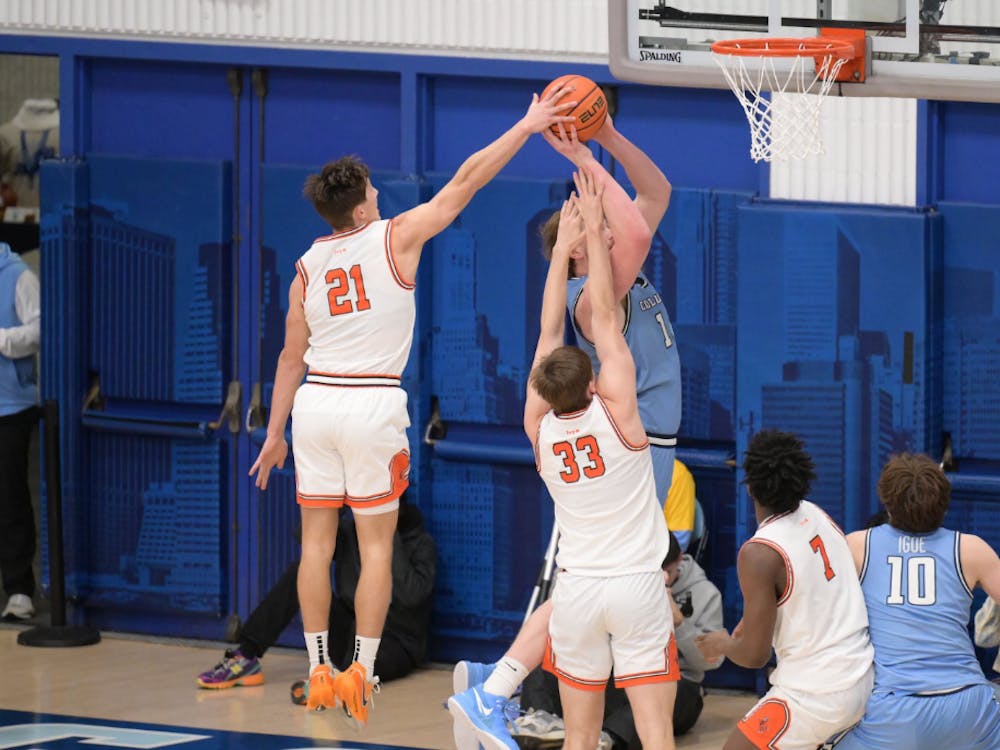To the NCAA, it was a minor infraction. To the Ivy League, it was a major offense.
Brown's football team was ruled ineligible to win the 2000 Ivy League championship as a result of recruiting and financial aid infractions in July. The sanctions make the Bears the first team in any sport in league history to be barred from competing for a league football title.
Although game results and statistics will count, no matter how Brown performs during the season, the championship trophy it shared with Yale last season will leave Rhode Island.
Above and beyond
The sanctions, imposed by the Council of Ivy Group Presidents, come in addition to those the university had already imposed upon itself, sanctions agreed to by the NCAA. In addition to football's ineligibility for the Ivy title, the team must reduce its number of football recruits by five in 2001 and 2002. Brown's self-imposed sanctions proposed a reduction in recruits for 2001 only.
"[The recruiting restrictions] were certainly intended to have an effect," Ivy League Executive Director Jeffrey Orleans said, "but at the same time it was not intended to be a death sentence."
In January the league notified the university that it had questions about offers of financial assistance given to members of the football, men's basketball, men's soccer and women's volleyball teams, the Boston Globe reported. League and university officials investigated and found that several infractions of NCAA and Ivy rules had occurred.
According to a university statement in April, Brown admitted that prospects were offered financial aid based on their athletic abilities. This aid was offered by an outside agency, the Brown Sports Foundation. The Sports Foundation is the fundraising arm of the athletics department and has a board of directors that includes many members of the university administration.
Janina
According to the Brown Daily Herald, a university investigation led by Janina Montero, Brown's vice president for campus life and student services and the former Dean of Student Life at Princeton, found that financial aid from the Sports Foundation had been given only to athletes. Currently the university has put the Foundation's operations under review by a panel that includes the former president of Dartmouth College, James Friedman.

David Zucconi, director of the Brown Sports Foundation, is prohibited indefinitely from direct or indirect contact with Brown student-athletes and from providing services or benefits to enrolled student-athletes. Zucconi has been transferred to the development office at Brown and will work strictly in a non-athletic role.
In June, the NCAA ruled that Brown was guilty of "secondary violations" and accepted the sanctions already imposed by the university. But during its annual meeting July 27, the Council took the opportunity to make a stronger statement.
"The League's prohibition against any special financial aid for athletes is perhaps the most fundamental of all League rules, which is why the Council is determined to make clear that the remedies for violations of this rule will be severe," Columbia President and Chair of the Council George Rupp said.
The Council declined to change or modify sanctions imposed by the university that will affect other teams on campus, the Brown Daily Herald reported. The coaches of the women's volleyball, men's soccer and men's basketball teams must reduce the number of paid recruiting visits by 25 percent, based on a three-year average.
Players still eligible

None of the athletes involved in these recruiting violations lost individual eligibility for this season.
"The students should not be at fault in this issue," Orleans said. "The violations in NCAA terms were not widespread or deliberate, so there was no reason to take away eligibility."
Originally, Brown had to suspend the eligibility of the players implicated in the scandal. The NCAA, however, agreed with the Ivy League's recommendation to lift the suspensions.
Bears head coach Phil Estes was happy with the decision not to penalize individual players, but still said he found the sanctions harsh.
"We're not cheaters," Estes told USA Today. "We were treated like cheaters, and that was wrong. There were mistakes that were made, but there was no intent."
With many of its skill players returning, Brown seemed to be in position to repeat as league champions. The Bears lost star quarterback James Perry to graduation, but return standout wide receiver Stephen Campbell — a preseason Division I-AA All-American.
After the Council's decision, however, the team has nothing to play for but pride.
Commenting on the Council's actions, Brown President Sheila Blumstein stated, "We regret the loss of the opportunity to be eligible for the Ivy Championship in football and the impact this decision will have on our student-athletes. Brown has always championed the principles of the Ivy League, and we recognize our responsibility to affirm these principles as we move forward."







